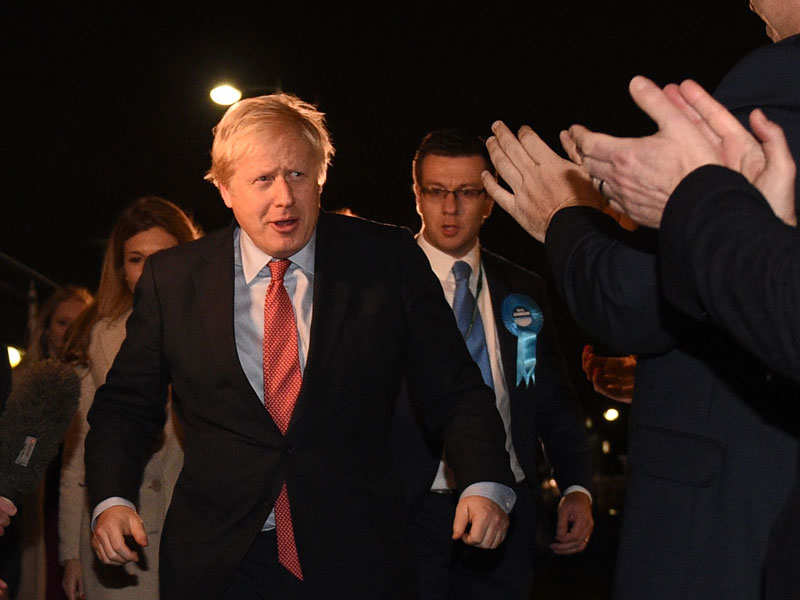The final count Friday had the Conservatives winning 365 spots in the 650-seat Parliament.
“Getting Brexit done is now the irrefutable, irresistible, unarguable decision of the British people,” Johnson said, standing in front of a backdrop that proclaimed “the People’s Government.”
“With this election, I think we’ve now put an end to all those miserable threats of a second referendum,” Johnson said.
Corbyn, after winning in his own Islington constituency, announced he would not lead his party in any future general-election campaign but that he intended to stay on as leader during a period of reflection.
“This is obviously a very disappointing night for the Labour Party,” he said.
He defended the popularity’s of the party’s platform, which sought to “right the wrongs and the injustices and inequalities that exist in this country.” And he attributed the party’s losses to the notion that “Brexit has so polarized and divided debate within this country, it has overridden so much of a normal political debate.”
Johnson — the bombastic showman who led the campaign to leave the European Union in the June 2016 referendum — is now positioned to be the prime minister to see Britain set sail from Europe next month.
And dreams of a second referendum — of remaining in the E.U. — have been dashed.
The pound sterling surged in after-hours trading when voting ended and the national exit poll showed the Conservatives forecast to win 368 out of 650 seats. The final tally was just three seats shy of that projection.
President Trump, who made little effort to hide his partiality toward Johnson during the election, tweeted his congratulations: “Britain and the United States will now be free to strike a massive new Trade Deal after BREXIT. This deal has the potential to be far bigger and more lucrative than any deal that could be made with the E.U. Celebrate Boris!”
John Bercow, the former speaker of the House of Commons known for shouting “order,” assessed, “It was a Brexit-focused, Brexit-oriented, Brexit-dominated campaign.”
Bercow told Sky News that with such a large parliamentary majority, Johnson could count on making the first stage of Brexit happen. “But that’s the withdrawal agreement,” said Bercow, a former Conservative lawmaker. “That is about the divorce bill; it’s about the rights of European citizens. It’s about the Irish border. I don’t think, if I may say so, that means getting Brexit done in the sense that it’s gift-wrapped or oven-ready for Christmas.”
Britain would enter into a year-long transition period and immediately begin to engage in talks over a free-trade agreement and a host of other vexing issues with its former partners in the continental bloc — such as trade, intelligence-sharing and the movement of capital.
Bercow predicted Britain would be debating Brexit for the next five, 10, possibly 15 years.
This was Britain’s third general election in a little more than four years, and the second since the June 2016 Brexit referendum. According to the surplus of opinion surveys and interviews, people are as hopelessly divided over the E.U. as they were when they voted 52 percent to 48 percent to leave.
Sara Hobolt, a political scientist at the London School of Economics, said the “genius of Boris Johnson” was that he united those who wanted Brexit behind him, while “the ‘Remain’ vote is much more split.”
Johnson and the Conservatives ran as populists, offering not only Brexit, but also a spending surge for cops, nurses, schools and elder care. One of their strategies was to try to break through Labour’s “red wall” of traditional support among the working classes in faded industrial towns in England’s north and Midlands.
Johnson on Friday morning specifically addressed voters who went Conservative for the first time in this election.
“You may have only lent us your vote,” he said. “I am humbled that you have put your trust in me, and you have put your trust in us, and I, and we, will never take your support for granted.”
With the Conservatives primed to extend their reign — from 2010 until 2024, if Johnson serves a full five-year term — Labour is looking at years in the opposition.
Reactions from Corbyn’s party were gloomy. Labour lawmaker Barry Gardiner called exit polls “obviously a devastating result for us.”
“It feels like a punch in the stomach,” Labour lawmaker Jess Phillips tweeted.
Party members immediately launched into a debate over who or what was to blame for a possible Tory landslide. Some on the left said it was Brexit, not Corbyn himself or the party’s transformative socialist agenda, that buried them.
“We had a very similar manifesto to the manifesto at the 2017 election, where with that manifesto and Jeremy’s leadership we gained 3 million votes,” said Richard Burgon, a Labour lawmaker. “The thing which appears to be different this time is it was an election in which Brexit overshadowed traditional party loyalties.”
While Johnson campaigned on a “Get Brexit Done” platform, Corbyn took a less decisive stance, proposing a softer Brexit — plus the guarantee of a second referendum within six months, another national vote on whether to stay or go, with the option to call the whole thing off.
Others said the problem was that Corbyn was unpopular and that Labour’s agenda was too radical.
Under Corbyn, the party swung hard to the left, calling for the nationalization of rail, mail, water and electricity, also pushing for a four-day workweek and free university tuition, and heavy taxes on corporations and the wealthy.
In any case, Corbyn is expected to face pressure to step down.
Tim Bale, a politics professor at Queen Mary University of London, said Labour has “a lot of very hard thinking to do, particularly with the leader it now chooses.”
He said that if the party selected its next leader in Corbyn’s image, it would be in “trouble.”
It was a grim night, too, for the anti-Brexit Liberal Democrats, whose leader, Jo Swinson, lost her seat to a candidate from the Scottish National Party.
Nationalist parties in Scotland and Northern Ireland, meanwhile, saw gains.
While Brexit was dominant in many voters’ minds on Thursday, it wasn’t the only issue they talked about.
Sarah Duncan, 71, a historian and lifelong Conservative voter, was up early to her London polling station, not far from the River Thames. She said this election “was particularly important because I’m very frightened of far-left-wing government and what Jeremy Corbyn could do to this country.”
Duncan confessed that in the June 2016 referendum, “I voted to stay, I didn’t vote for Brexit, but I do feel that because the country has voted for Brexit, it’s a democratic country, and we should do what the majority said and we should leave, and that’s what Boris has stood for.” As a leader, she said, “he hasn’t had a chance to prove himself yet. We will wait and see.”
Nick Symes, 53, a yacht broker, standing in the rain, said he voted for the Labour Party because “it’s socialist, it’s why I like it, it’s redistributive, and it’s not Boris Johnson.”
Josh Hawketts, 27, an underwriter, voted Labour in his constituency in Battersea, southwest London. Standing outside a polling station just before sunrise, he explained that his vote was “not for Corbyn or anything like that; it was purely tactical. Just anti-Tory, basically.”
In Brussels, E.U. leaders who had gathered for a previously planned summit stayed up for a late night of election results-watching. Several said they just wanted to get Brexit over with.
Perhaps surprisingly, more than one top diplomat said they were hoping for a robust majority for the eventual victor — and not a hung Parliament, as many British remainers wanted.
“The best thing for Ireland, for the U.K. and for Europe would be an end to the uncertainty,” Irish Prime Minister Leo Varadkar told reporters in Brussels. “What’s been very hard to work with is a Parliament that was a hung Parliament, that wasn’t able to come to a majority decision on anything.”
Privately, some diplomats who work on Brexit said that a sweeping majority for pro-Brexit Johnson, paradoxically, might result in Britain staying more closely aligned with the E.U. than if he had weak control over Parliament. A big majority, the diplomats reasoned, gives Johnson more flexibility to make compromises during what is likely to be a year of lightning-fast negotiations on a trade deal. If Johnson had only a few votes to spare, he would be more vulnerable to be taken hostage by Brexit hard-liners who insist on the sharpest possible split from Europe.
Warning: Undefined variable $post in /var/www/wp-content/themes/newsup/inc/ansar/hooks/hook-index-main.php on line 117




GREAT WIN FOR BRITAIN! GREAT WIN FOR JOHNSON! GREAT WIN FOR PRESIDENT TRUMP!🇺🇸
PM Johnson is not a classic conservative, but he has taken leadership of the Conservative Party. There is potential fro advancing the conservative agenda, if he is sincere and diligent.
Royale, I hope for Europe’s sake that he goes down the Conservative Party line.
the bloke would like to be a king he is completely deluded and every time he opens his mouth and speaks it is nothing but lies